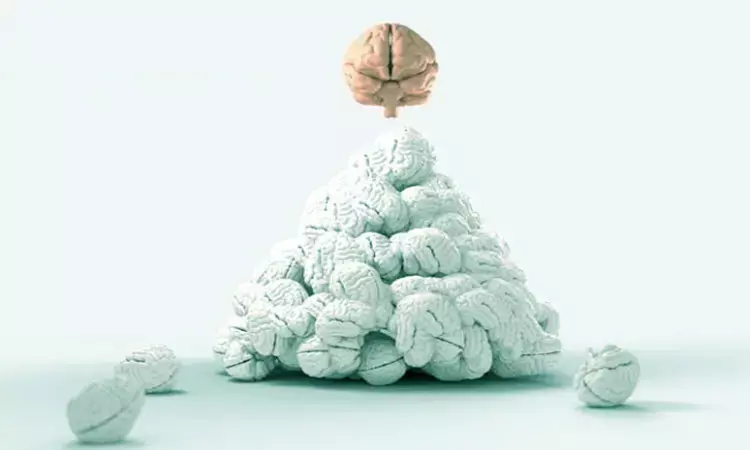- Home
- Medical news & Guidelines
- Anesthesiology
- Cardiology and CTVS
- Critical Care
- Dentistry
- Dermatology
- Diabetes and Endocrinology
- ENT
- Gastroenterology
- Medicine
- Nephrology
- Neurology
- Obstretics-Gynaecology
- Oncology
- Ophthalmology
- Orthopaedics
- Pediatrics-Neonatology
- Psychiatry
- Pulmonology
- Radiology
- Surgery
- Urology
- Laboratory Medicine
- Diet
- Nursing
- Paramedical
- Physiotherapy
- Health news
- Fact Check
- Bone Health Fact Check
- Brain Health Fact Check
- Cancer Related Fact Check
- Child Care Fact Check
- Dental and oral health fact check
- Diabetes and metabolic health fact check
- Diet and Nutrition Fact Check
- Eye and ENT Care Fact Check
- Fitness fact check
- Gut health fact check
- Heart health fact check
- Kidney health fact check
- Medical education fact check
- Men's health fact check
- Respiratory fact check
- Skin and hair care fact check
- Vaccine and Immunization fact check
- Women's health fact check
- AYUSH
- State News
- Andaman and Nicobar Islands
- Andhra Pradesh
- Arunachal Pradesh
- Assam
- Bihar
- Chandigarh
- Chattisgarh
- Dadra and Nagar Haveli
- Daman and Diu
- Delhi
- Goa
- Gujarat
- Haryana
- Himachal Pradesh
- Jammu & Kashmir
- Jharkhand
- Karnataka
- Kerala
- Ladakh
- Lakshadweep
- Madhya Pradesh
- Maharashtra
- Manipur
- Meghalaya
- Mizoram
- Nagaland
- Odisha
- Puducherry
- Punjab
- Rajasthan
- Sikkim
- Tamil Nadu
- Telangana
- Tripura
- Uttar Pradesh
- Uttrakhand
- West Bengal
- Medical Education
- Industry
Noninvasive brain biopsy shows improved sensitivity in tumor detection

Glioblastomas are aggressive brain tumors that are commonly diagnosed through a risky and invasive surgical biopsy. A team of researchers led by Hong Chen at Washington University in St. Louis has developed a noninvasive diagnostic method that may one day replace the tissue biopsy with a simple blood test.
Chen, associate professor of biomedical engineering in the McKelvey School of Engineering and of radiation oncology in the School of Medicine; Eric Leuthardt, MD, professor of neurosurgery at Washington University School of Medicine and of biomedical engineering in McKelvey Engineering; and the team tested the method in both small and large animal models and found significantly improved detection and diagnostic sensitivity for brain tumors via a simple blood sample. Results of the study are published online in Theranostics Nov. 10, 2021.
The method, known as sonobiopsy, uses focused ultrasound to target tumors deep in the brain. Once located, the researchers inject microbubbles into the blood that travel to the ultrasound-targeted tissue and pulsate, which safely opens the blood-brain barrier. The temporary openings allow biomarkers, such as DNA, RNA and proteins, from the tumor to pass through the blood-brain barrier and release into the blood.
Chen, Leuthardt and the team have been working on their focused ultrasound-enabled liquid biopsy (sonobiopsy) method for several years, first conducting a feasibility study in mice, followed by a safety evaluation study, and most recently, another study in pigs. While blood-based liquid biopsy has been used in human patients with other cancers for personalized medicine, progress in extending the method to human brain cancer has been limited.
In the new research, the team, including Christopher Pacia, first author and a biomedical engineering doctoral student in the Chen Ultrasound lab, found that the sonobiopsy method boosted detection of genes highly expressed in the mouse model of glioblastoma, EGFRvIII. The DNA levels of EGFRvIII circulating in the bloodstream of the group that underwent sonobiopsy was 920 times greater than the group that underwent convention blood-based liquid biopsy. Further, detection of another circulating tumor genetic marker, TERT C228T ctDNA was 10-fold higher after sonobiopsy. In addition, the method improved diagnostic sensitive from 7.14% to 64.71% for EGFRvIII and from 14.29% to 45.83% for TERT C228T. The team found no increase in tissue damage in the tumor region of interest after the sonobiopsy.
In the pig model, sonobiopsy boosted detection of EGFRvIII ctDNA by 270-fold and increased levels of TERT ctDNA nine-fold. It improved diagnostic sensitivity from 28.57% to 100% for EGFRvIII and from 42.86% to 71.43% for TERT C228T. No significant tissue damage was found.
"Our study showed that sonobiopsy enriched tumor-specific ctDNA in the plasma and improved the detection sensitivity for two glioblastoma phenotypes without posing significant safety risks," Chen said. "The integration of sonobiopsy with advanced blood analysis assays has the promise to provide minimally invasive, spatiotemporal-controlled, and sensitive diagnosis of brain cancer."
This work is a collaborative effort involving members from both engineering and medical schools, including Eric Leuthardt, MD, chief of the Division of Neurotechnology and of the Center for Innovation in Neuroscience and Technology and professor of neurosurgery and of neuroscience at the School of Medicine, as well as of biomedical engineering and of mechanical engineering and of applied science in the McKelvey School of Engineering.
"Besides neuroimaging and surgically-acquired tissue for pathology and molecular profiling, sonobiopsy has the potential to become the third pillar for brain tumor management by substantially advancing brain cancer diagnosis, treatment monitoring, and recurrence detection," Leuthardt said. "This enhanced capability could have an important impact throughout the continuum of patient care."
https://www.thno.org/v12p0362.htm,
Hina Zahid Joined Medical Dialogue in 2017 with a passion to work as a Reporter. She coordinates with various national and international journals and association and covers all the stories related to Medical guidelines, Medical Journals, rare medical surgeries as well as all the updates in the medical field. Email: editorial@medicaldialogues.in. Contact no. 011-43720751
Dr Kamal Kant Kohli-MBBS, DTCD- a chest specialist with more than 30 years of practice and a flair for writing clinical articles, Dr Kamal Kant Kohli joined Medical Dialogues as a Chief Editor of Medical News. Besides writing articles, as an editor, he proofreads and verifies all the medical content published on Medical Dialogues including those coming from journals, studies,medical conferences,guidelines etc. Email: drkohli@medicaldialogues.in. Contact no. 011-43720751


